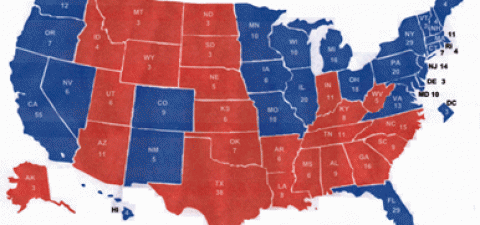Republican States Run Surpluses, Democrat States Run Deficits

One of the wonderful things about our federalist system of government is that our states can act as “laboratories of democracy,” as Supreme Court Justice Louis Brandeis put it. Which is to say, each state can address policy issues in different way, with observable differences in results.
It’s interesting to apply that to fiscal issue. At the national level, and in Democrat-controlled states, fiscal matters are a mess. In Republican states, things are much more orderly:
According to the Congressional Budget Office, the federal government posted a $293 billion deficit in the first fiscal quarter of 2013, setting the Obama administration up for a record fifth-year of trillion dollar deficits. But while the fiscal condition of the Democratically controlled federal government is still atrocious, Republican controlled states are now swimming in surpluses.
Thanks to a Republican governor committed to developing its natural resources, not punishing entrepreneurs who do, Texas legislators are facing an $8.8 billion surplus over the next two years. To the east, Republican governors Bill Haslam of Tennessee and Rick Scott of Florida have also turned recession deficits into budget surpluses. Moving north, Michigan’s Gov. Rick Snyder, Iowa’s Gov. Terry Brandstad, and Indiana’s out-going-Gov. Mitch Daniels, also can now all boast surpluses in the hundreds of millions of dollars. All of these governors managed to turn their state’s fiscal situation around through spending cuts, not tax hikes. Now their budgets are in the black and their economies are growing.
Things do not look as good in Democrat-controlled states. Illinois, who massively raised taxes on the rich, still has a $5.9 billion stack of unpaid bills. California, who also raised taxes on the rich, was supposed to post a small surplus this year. But tax collections are coming in at 10.8 percent below budget projections. As a result, the state is now projected to be $1.9 billion in the red by the end of this fiscal year.
Of course, things aren’t quite as simple as this. In North Dakota, another Republican-controlled state running a big budget surplus, Republicans have been anything but fiscally restrained. Since 2003 the state’s budget has increased by 156%. We’re running a surplus because, thanks to the state’s oil boom, revenues are growing even faster than spending.
But in general, this speaks volumes about what works and what doesn’t in terms of getting finances in line. What works is spending cuts, and tax reductions. What doesn’t work is spending and tax hikes.







